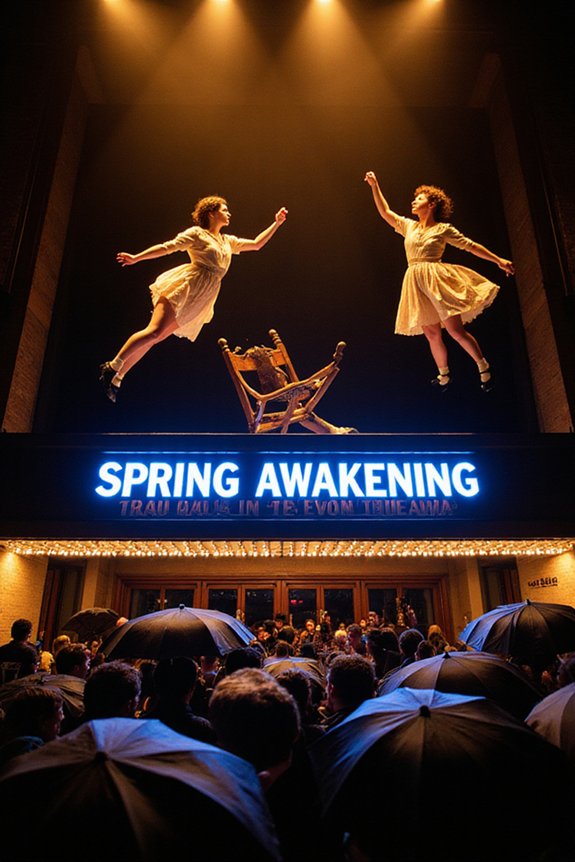As an Amazon Associate, we earn from qualifying purchases. Some links may be affiliate links at no extra cost to you. Although our opinions are based on curated research, we haven't used these products. Articles generated with AI.

School of Rock: The Epic Comeback of Andrew Lloyd Webber
Andrew Lloyd Webber’s musical adaptation of “School of Rock” signifies a revival of his creative prowess. The show premiered on Broadway on December 6, 2015, featuring a vibrant score that includes both original songs and iconic numbers. Key collaborators include book writer Julian Fellowes and lyricist Glenn Slater, working together to enhance character development. Significantly, the production integrates live instrumentation by young performers, creating a dynamic experience. Further insights into its continued success and innovative features await exploration.
Key Takeaways
- Andrew Lloyd Webber acquired stage rights for “School of Rock” in 2013, marking a significant new venture in his musical repertoire.
- The Broadway premiere on December 6, 2015, showcased Webber’s innovative blend of rock and traditional musical elements.
- The musical features original compositions alongside iconic numbers, emphasizing character development and youth-centric narratives.
- Webber’s collaboration with Julian Fellowes and Glenn Slater resulted in a dynamic script and engaging lyrics, enhancing audience appeal.
- Critical acclaim and strong audience reception reaffirmed Webber’s successful comeback, with performances hailed as energetic and captivating for all ages.
The Journey From Film to Stage
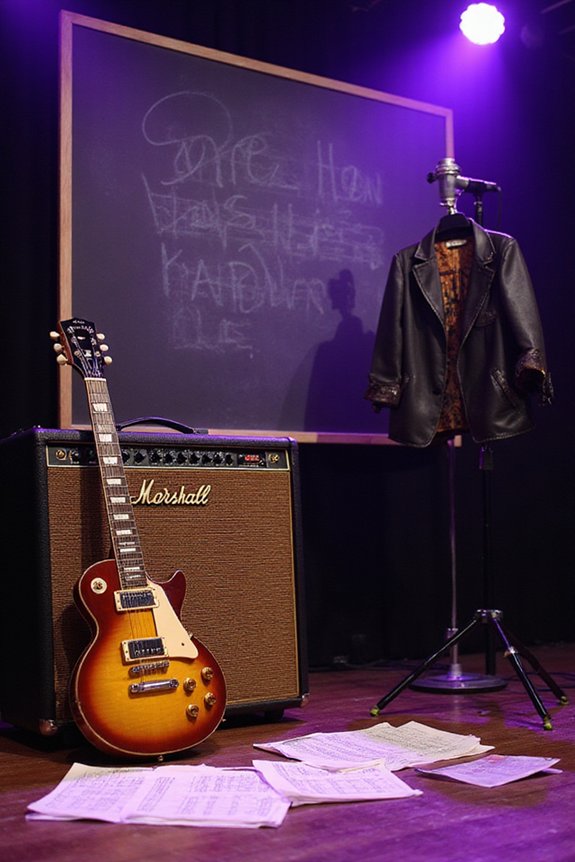
The journey from film to stage for “School of Rock” began with significant developments in 2013, when Andrew Lloyd Webber acquired the stage rights to the beloved movie. This adaptation intended to deepen character development, focusing on the young students and their journeys.
Key components in this shift included:
- Creative Collaborations: Julian Fellowes penned the script, while Glenn Slater crafted the lyrics, aiming for thematic depth beyond the film.
- Musical Diversity: New songs complemented iconic numbers, ensuring a variety of theatrical experiences.
- Enhanced Storytelling: The narrative explored the lives of students and their parents, enriching the material.
The adaptation strove to engage a wider audience, allowing everyone to feel a sense of connection to the story and its characters.
A Rocking Broadway Premiere
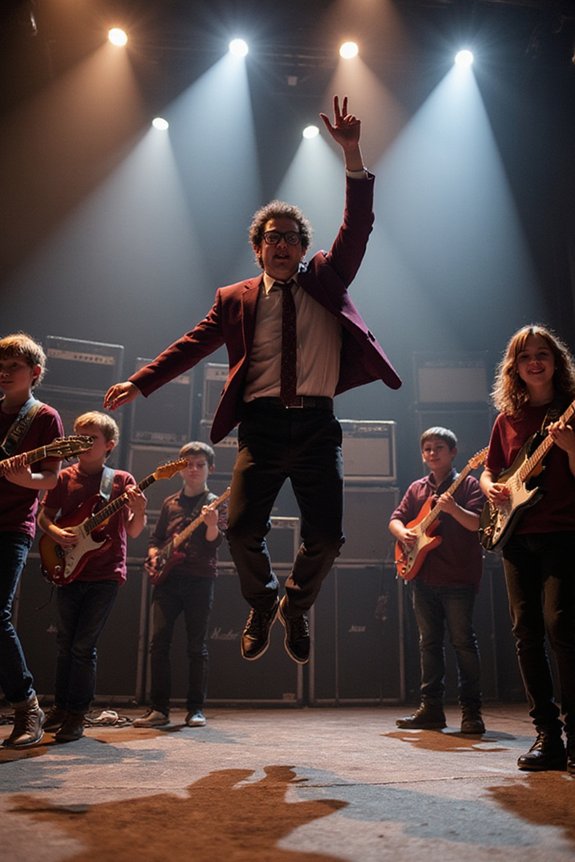
A Broadway premiere can generate considerable excitement, and “School of Rock” was no exception when it officially opened on December 6, 2015, at the Winter Garden Theatre after a series of preview performances that began on November 9. The venue, renowned for hosting large-scale productions, provided a vibrant atmosphere that energized both the audience and the performers.
Critics and audiences alike celebrated the show, with Ben Brantley of The New York Times naming it a ‘Critics’ Pick.’ The production featured Alex Brightman as Dewey Finn and energetic child actors, showcasing original music by Andrew Lloyd Webber. Over its 1,309 performances, “School of Rock” made a significant impact on Broadway, solidifying its place as a remarkable Broadway debut.
The Creative Minds Behind the Musical
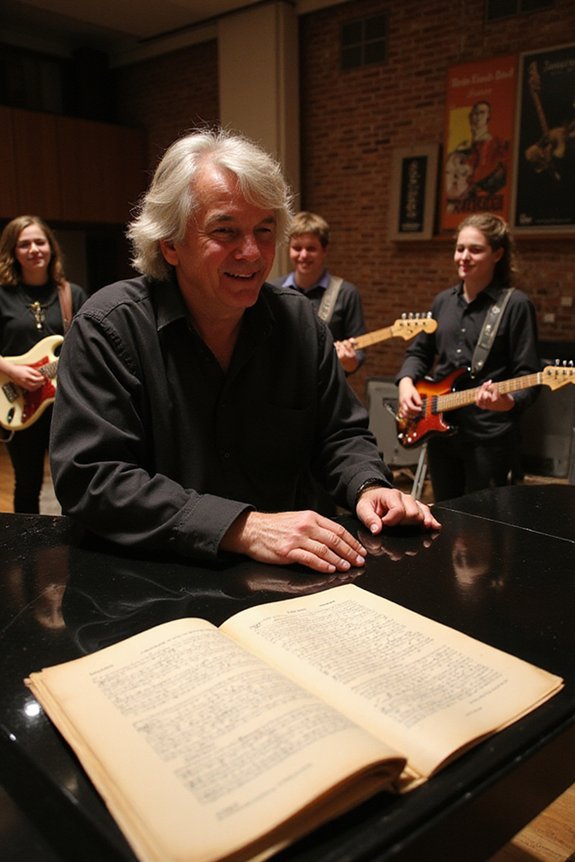
Creative collaboration played a crucial role in the development of “School of Rock,” combining the talents of renowned artists to bring the musical to life. Key contributors included composer Andrew Lloyd Webber, book writer Julian Fellowes, and lyricist Glenn Slater. Their collaborative process involved extensive discussions and workshops over two years, fostering creative synergy while respecting the original film’s spirit.
Director Laurence Connor shaped the vision and staging, while Anna Louizos designed the scenic and costume elements that brought the story to the stage. Through coordinated casting by Tara Rubin, the team identified young talents, ensuring a vibrant performance. This collective effort resulted in a dynamic musical that successfully bridges traditional Broadway and modern storytelling.
Musical Innovations and New Compositions
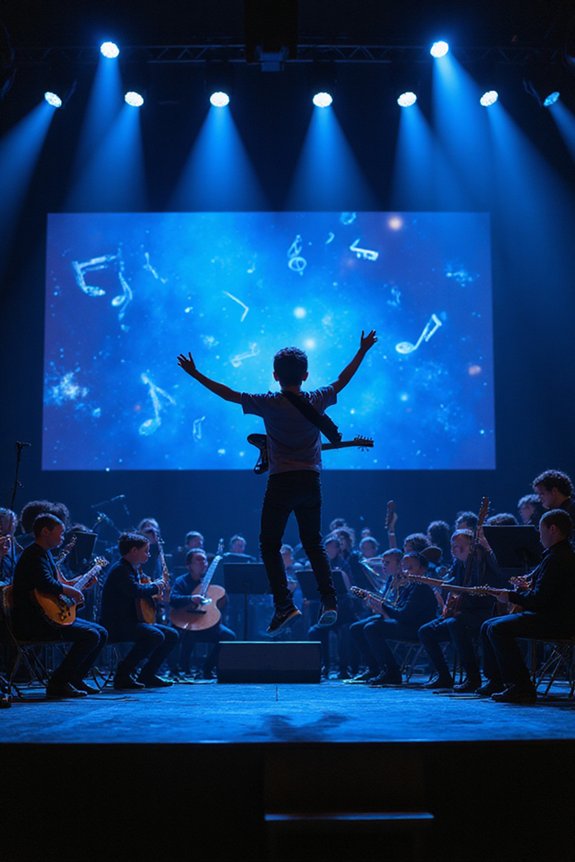
Musical innovations and new compositions stand at the forefront of “School of Rock,” transforming the Broadway landscape with a distinctive blend of styles. This production marks a shift toward mainstream rock and pop, integrating live instrumentation by child performers, which enhances musical spontaneity. Guitar-driven rock solos and original anthems like “Stick It to the Man” showcase Andrew Lloyd Webber’s versatility, designed to engage youth.
Key features include:
- Roles for young talent as principal band members, emphasizing authenticity.
- Dynamic stage chemistry from collaborations with youth musicians.
- Orchestrations blending rock elements with traditional Broadway instrumentation.
These innovations not only resonate with younger audiences but create a new paradigm for live musical theater, encouraging participation and enjoyment.
Critical Acclaim and Audience Reception
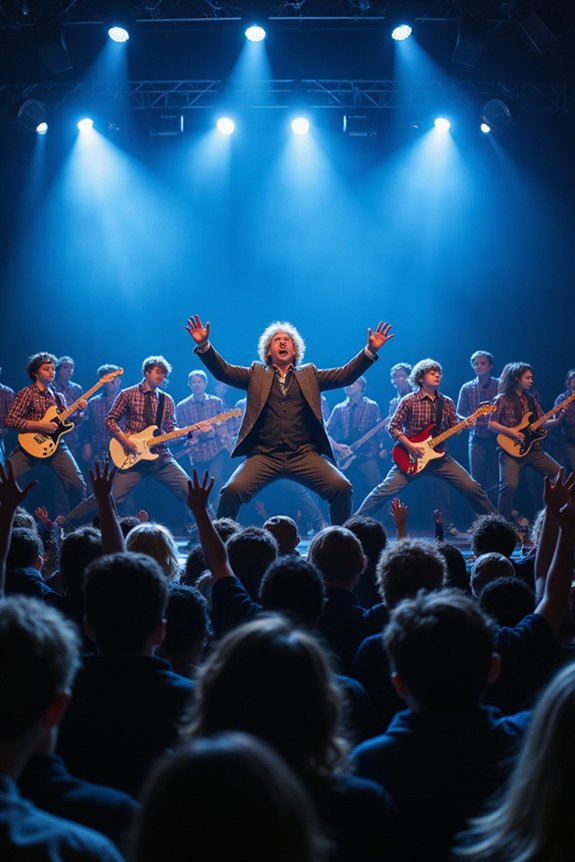
Key highlights include:
The critical reception of *School of Rock* showcases an overall positive response, with most reviewers appreciating Andrew Lloyd Webber’s jaunty score and elegant melodies amidst rock influences.
- Critics noted the musical’s impactful engagement, likening it to beloved works like The Sound of Musicand revitalizing Webber’s rock roots from *Jesus Christ Superstar*.
- Audience feedback emphasized the dynamic performances of the cast, particularly the lead portraying Dewey, alongside commendations for the adult ensemble’s energetic delivery.
- Notable elements, including lighting, costumes, and sound, also received praise, enhancing the show’s visual and auditory experience.
- Overall, School of Rockwas described as a “rock solid hit,” resonating with audiences of all ages and inspiring enthusiasm throughout.
Transfer to the West End and Continued Success
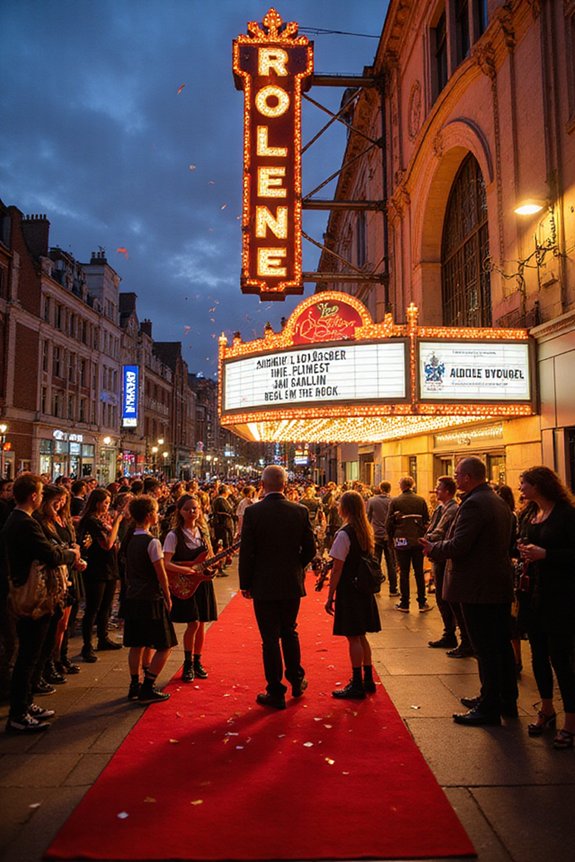
Key factors included:
- Adaptation of stage rights acquired by Andrew Lloyd Webber in 2013.
- Early casting choices facilitated a brisk shift to London, advancing the expected launch from 2017 to late 2016.
- Retention of original songs alongside new compositions enhanced its score.
The production achieved commercial success, earning an Olivier Award for Outstanding Achievement in Music, showcasing the dynamic performances of its youth cast, and solidifying its standing in the West End.
Andrew Lloyd Webber’s Musical Legacy
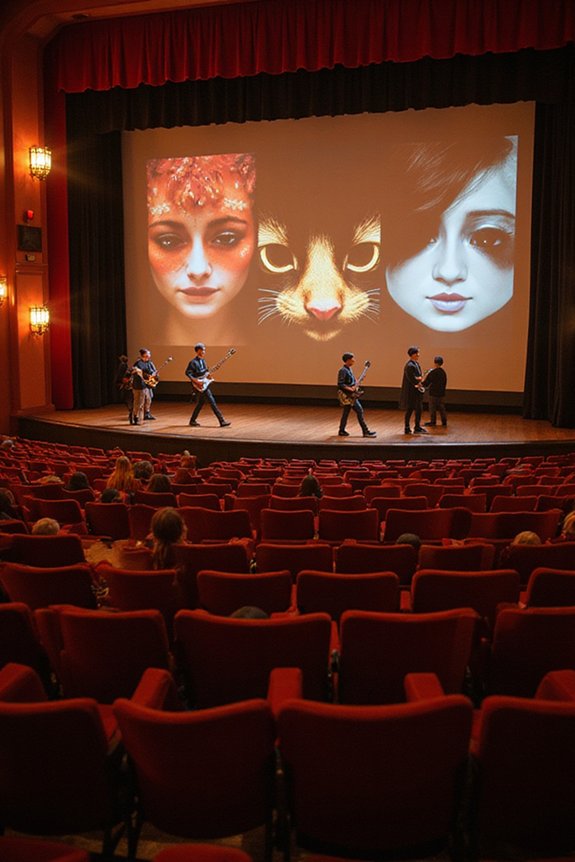
Webber’s accolades, including seven Tony Awards and multiple Grammy recognitions, underscore his influence across varied entertainment sectors. Additionally, his innovations, such as rock operas and concept albums, have shaped the landscape of musical theater, accessible to wide audiences. Collaborative projects like *Bombay Dreams* signify his role in merging cultural music styles, further broadening the genre’s appeal. Consequently, Lloyd Webber’s legacy exemplifies the power of storytelling through engaging melodies and compelling narratives.
Inspiring the Next Generation of Musicians
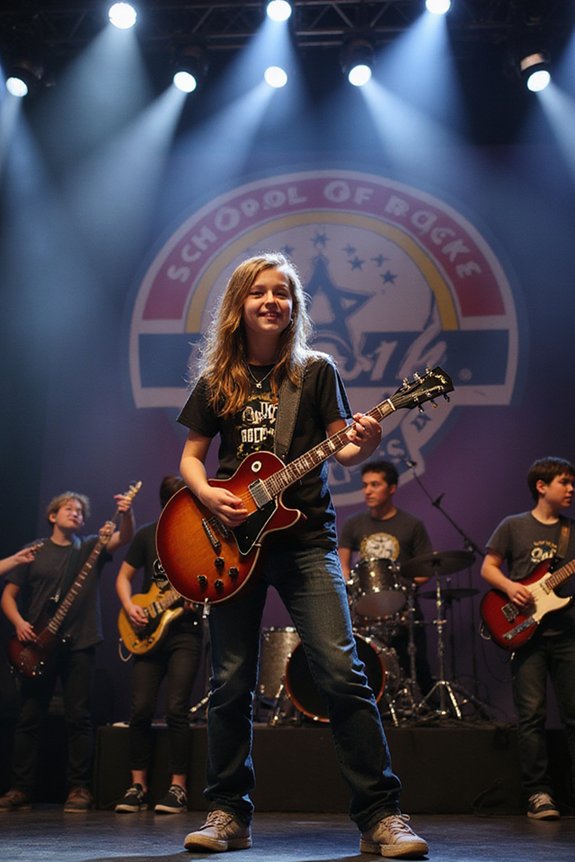
The Andrew Lloyd Webber Foundation further supports equitable access by supplying instruments and performance opportunities, enriching the educational landscape. Together, these efforts illustrate a commitment to embedding music in curricula, enhancing students’ creativity and community involvement. Ultimately, such initiatives create pathways for young learners to discover and nurture their musical talents.
Frequently Asked Questions
What Are the Age Restrictions for Child Performers in “School of Rock”?
Child performer regulations stipulate that individuals must be between 13 and 19 years old to audition. These audition age limits guarantee that young talents can showcase their abilities while nurturing a supportive community through shared experiences.
How Many New Songs Were Created for the Musical Compared to the Film?
In this musical journey, new songs blossom amidst musical differences. While the 2003 film featured classic rock anthems, the stage adaptation introduced approximately twelve original compositions, revitalizing the narrative and enchanting audiences with fresh melodies.
Can You Buy the Original Broadway Cast Recording of “School of Rock”?
Yes, the original cast album of *School of Rock* is available for purchase in various formats and retailers. Fans can find this recording to connect with its vibrant music and celebrate the musical’s energy together.
Where Can I See a Performance of “School of Rock” Today?
For those seeking local performances of “School of Rock” today, ticket availability can be found at nearby theatres featuring community productions. Engaging in such performances fosters a sense of belonging through shared musical experiences.
What Inspired Andrew Lloyd Webber to Adapt “School of Rock” for the Stage?
Amidst a serendipitous moment of musical inspiration, Andrew Lloyd Webber recognized a chance within his creative process to redefine rock theater. He envisioned a vibrant adaptation, blending humor and live performances, capturing youthful energy and empowerment.



